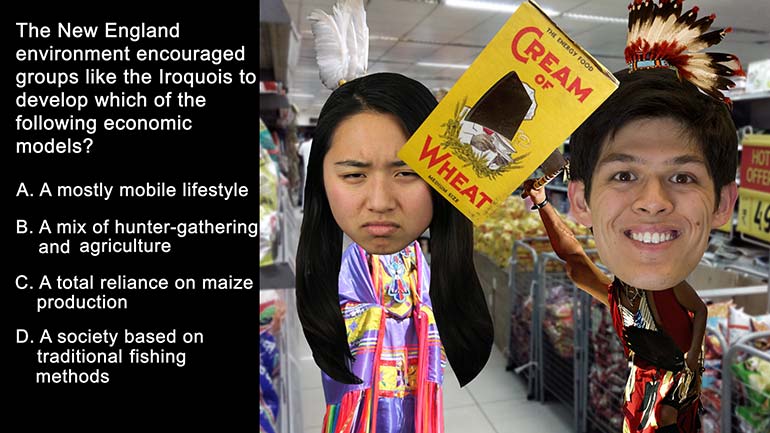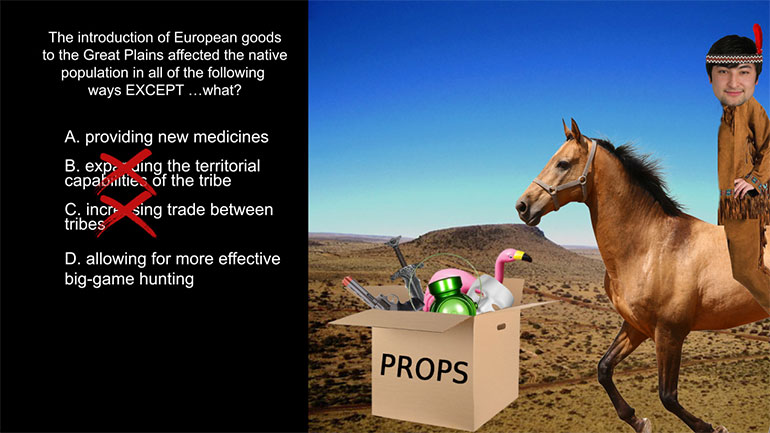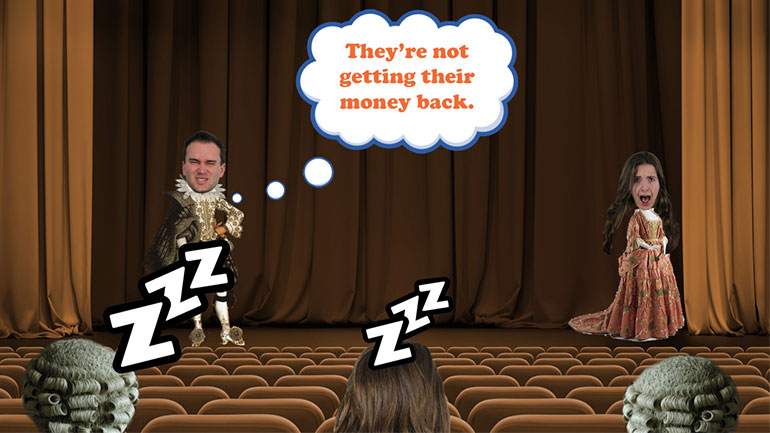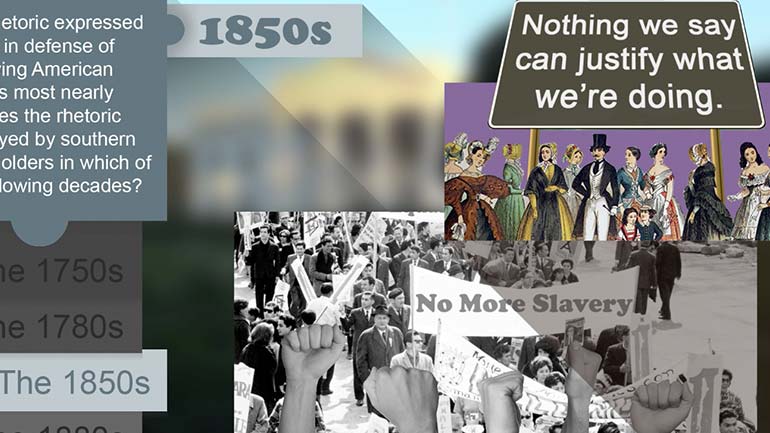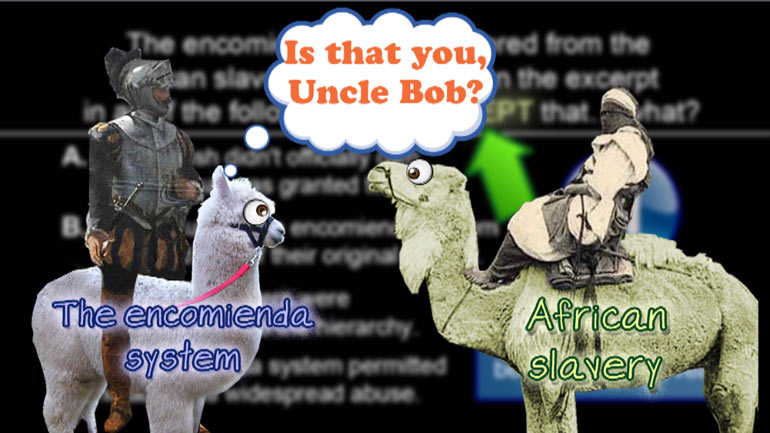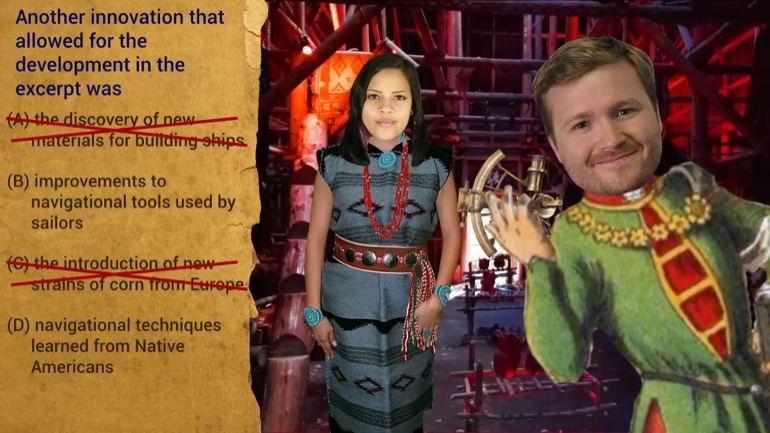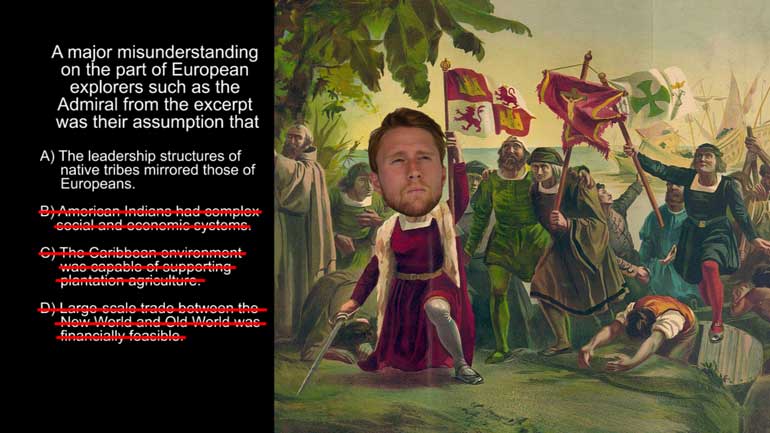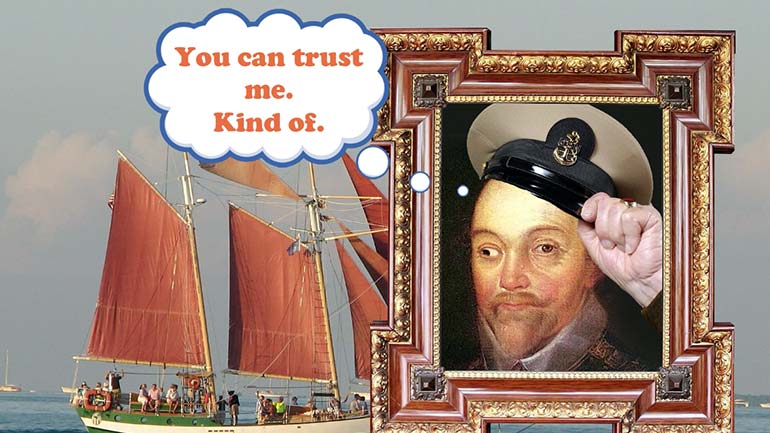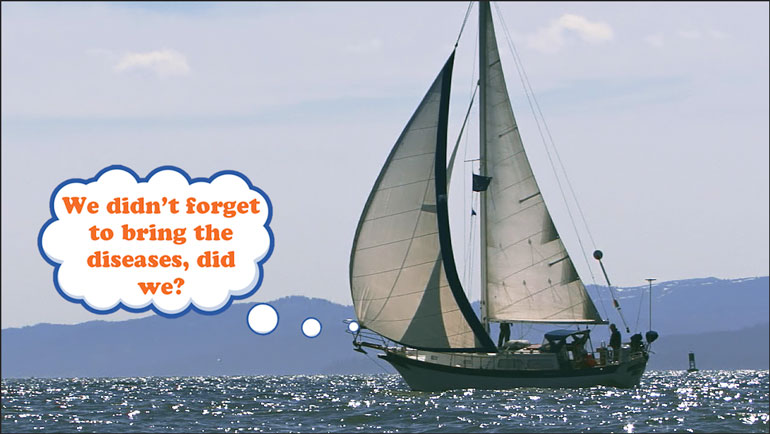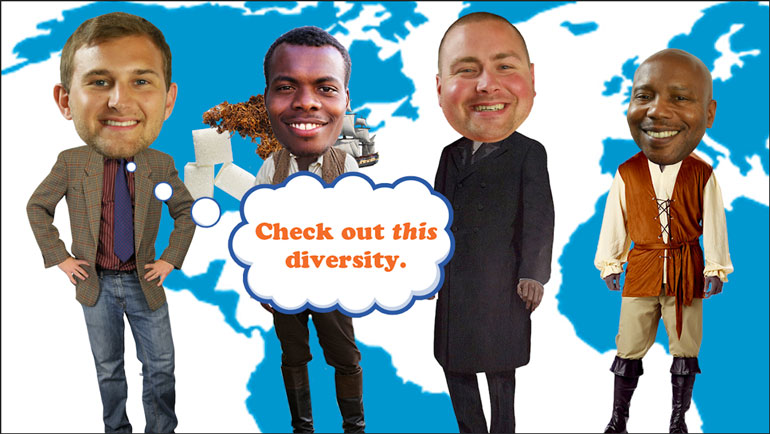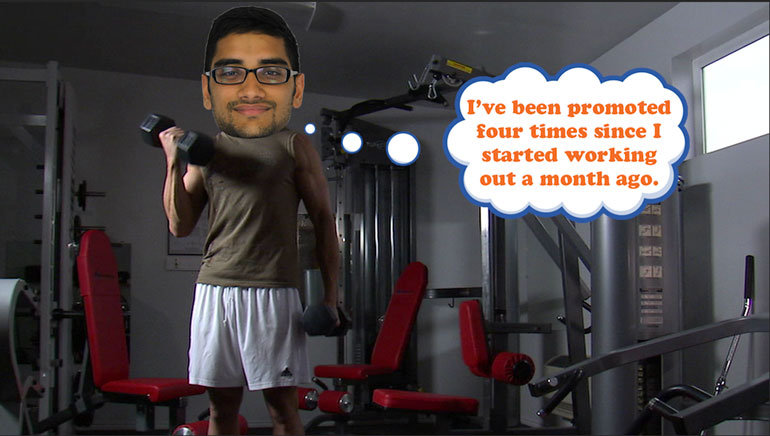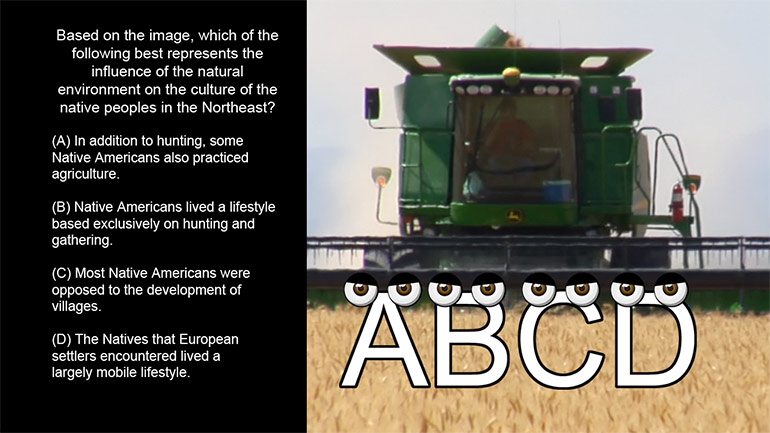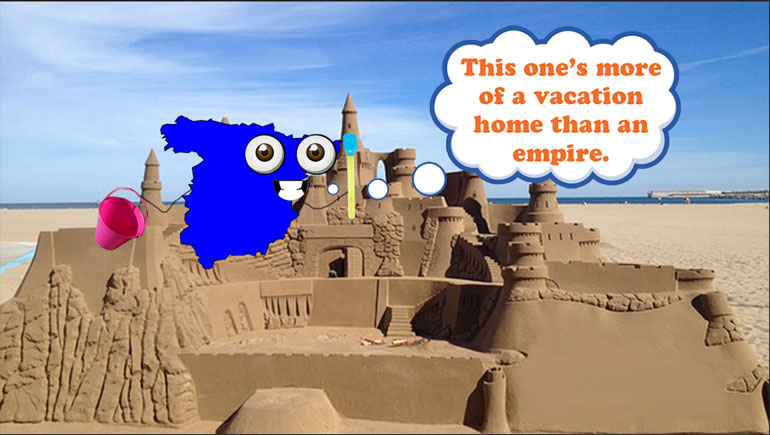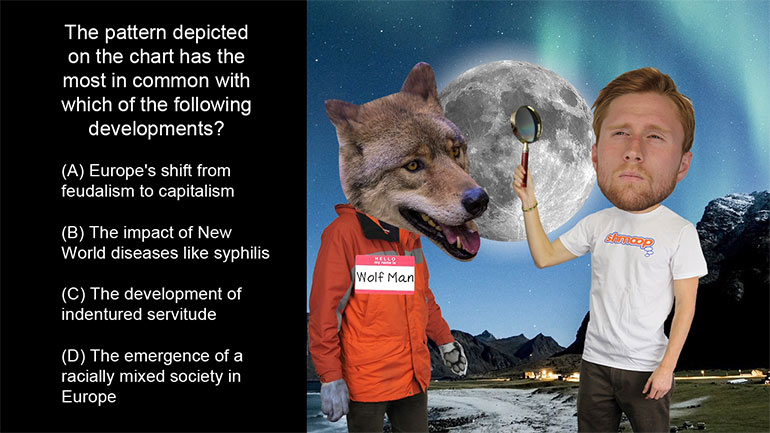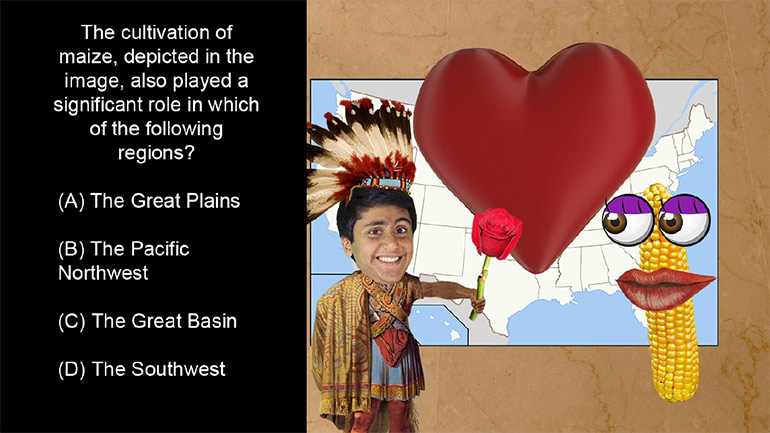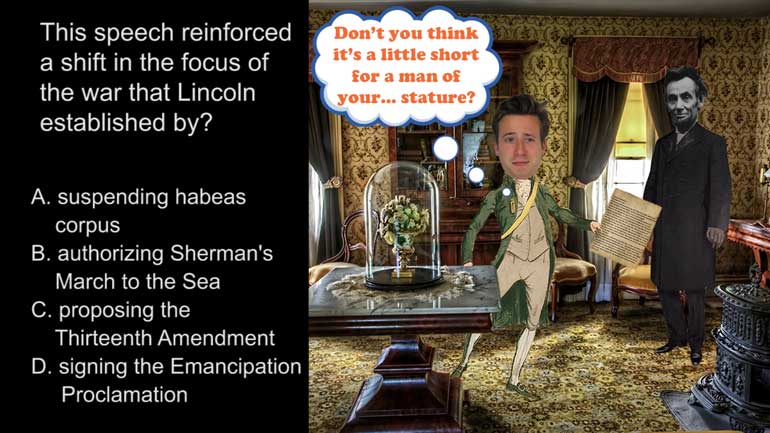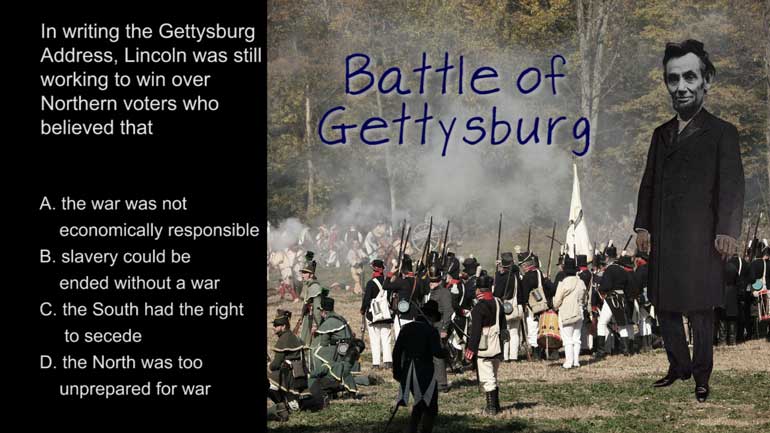ShmoopTube
Where Monty Python meets your 10th grade teacher.
Search Thousands of Shmoop Videos
Period 1: 1491–1607 Videos 17 videos
What kind of economic model did New England's environment encourage the Iroquois, and similar cultures, to adopt?
AP U.S. History 1.2 Period 1: 1491-1607. The introduction of European goods to the Great Plains affected the native population in all of the follow...
AP U.S. History: Period 1: 1491–1607. Drill 1, Problem 3. Increased colonization of the New World was partly facilitated by which of the followin...
AP U.S. History 2.5 Period 1: 1491-1607 311 Views
Share It!
Description:
AP U.S. History: Period 1 1491-1607 Drill 2, Problem 5. Inhabitants of the New World, like the "Cimaroons," who Sir Francis Drake mentions above, may have been wary to help the English sea captain because of...what?
Transcript
- 00:00
[ musical flourish ]
- 00:03
And here's your shmoop du jour,
- 00:05
brought to you by Sir Francis Drake,
- 00:07
the world's most talented rapper/actor/explorer.
- 00:11
Yeah, baby.
Full Transcript
- 00:12
All right, so give this excerpt a read.
- 00:14
All right, the next day...
- 00:16
[ mumbles ]
- 00:18
[ mumbling continues ]
- 00:23
All right, and now the question:
- 00:25
Inhabitants of the New World, like the "Cimaroons,"
- 00:28
who Sir Francis Drake mentions above,
- 00:30
may have been wary to help the English sea captain because of... what?
- 00:34
And here are the potential answers.
- 00:36
The English were allied with the Spanish...
- 00:38
[ mumbles ]
- 00:41
All right, well, who exactly were these "Cimaroons"?
- 00:45
Sounds like a candy or something.
- 00:47
All right, well, the English version of this word is "Maroon,"
- 00:51
which refers to the populations of escaped slaves
- 00:55
who settled in the New World.
- 00:57
It's also where we get the verb "to maroon,"
- 00:59
like when Gilligan and his gang, uh, you know,
- 01:01
got stuck on that island in the middle of nowhere.
- 01:03
If you don't know it, ask your parents. It was a great series for a long time.
- 01:06
So, we need to figure out why these escaped slaves
- 01:09
were less than thrilled to help out our English sea captain,
- 01:13
and professional scallywag, Sir Francis Drake.
- 01:16
Was it because A - the English were allied with the Spanish?
- 01:20
Well, remember that the English and Spanish
- 01:22
were fighting continually throughout this period of time,
- 01:25
kind of like siblings in the back seat on a long family road trip.
- 01:28
"Are we there yet, are we there yet, are we there yet?"
- 01:30
Yeah, like that. So that can't be it.
- 01:32
Were the Cimaroons hesitant to help the English because B -
- 01:36
traditional doctrines forbade contact with outsiders?
- 01:39
Well, the Cimaroons weren't jumping at the chance
- 01:41
to hang out with the Europeans, but not because
- 01:44
there was a policy against it. It was more of
- 01:46
a personal preference thing. Think of it like a friend who,
- 01:49
as a general rule, doesn't like to eat out at restaurants...
- 01:51
unless you're the one paying for it.
- 01:53
So, uh, not the best choice.
- 01:56
Could it have been because D -
- 01:57
they never had interacted with Europeans before?
- 02:00
[ chuckles ] As if.
- 02:01
These escaped slaves were slaves in the first place
- 02:04
because they came into contact with the Europeans back in Africa.
- 02:07
Not to mention that in Jamaica, new Cimaroon communities
- 02:11
were continually at war with the British.
- 02:13
So, let's knock that one off, too.
- 02:15
Which leaves us with C -
- 02:17
because of the Cimaroons' origins as escaped slaves and their descendants.
- 02:21
All right, makes sense, right?
- 02:23
I mean, you escape from slavery, establish your own community
- 02:26
in the Carribean in hopes of preserving your language
- 02:29
and traditions from Africa, and then the people
- 02:32
who enslaved you in the first place show up and ask you for help.
- 02:36
[ chuckles ] There might be some issues
- 02:37
still left to work out there. So C is our answer.
- 02:40
And, you know, they say it's better to forgive than forget.
- 02:43
Uh, but not sure everyone would agree with that.
- 02:45
Yeah, let's go there.
Related Videos
AP U.S. History Exam 2.45. The journey shown on the map was an example of...what?
AP U.S. History Exam 2.26. This speech reinforced a shift in the focus of the war that Lincoln established by...what?
What did the Spanish messengers bring with them to North America? Hint: you probably wouldn't be thrilled to get this for your next birthday.
AP U.S. History Diagnostic 24. How did the United States choose containment over the National Security Council Report in Latin America?
AP U.S. History Exam 2.25. In writing the Gettysburg Address, Lincoln was still working to win over Northern voters who believed that...what?
